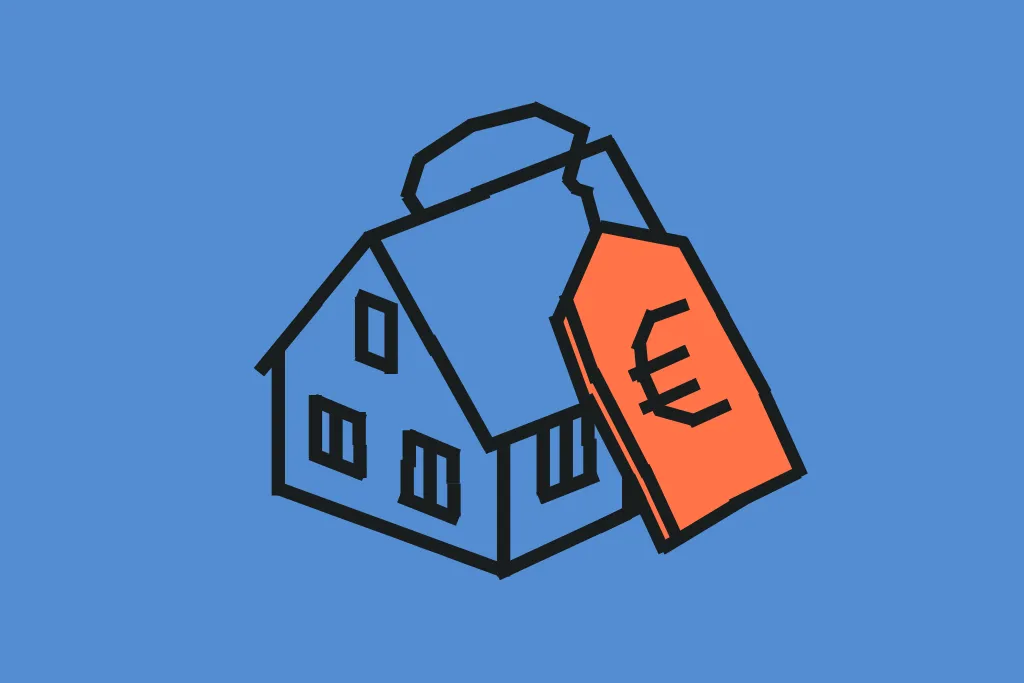Surplus value withdrawal calculator
Calculate immediately how much excess value you have and approximately how much you can use for your next move.
How should you calculate home surplus value?
You want to know how much excess value on your home you have. Makes sense, because that amount can give you many options. Whether you want to move, remodel or just want more financial space. In three simple steps you can calculate the surplus value of your home yourself:
- What is your property worth?
- How much mortgage debt do you have?
- Subtract your debt from the value.
1. What is your property worth?
The first step is to determine the home value. Without that value, you don't know how much excess value you have. Fortunately, you can do this in several ways.
- Check websites such as funda or the Land Registry.
- Use your recent WOZ value. You can find it on the municipality's WOZ decision.
- If necessary, have an appraisal done for a more accurate picture.
The value of your home will soon determine your surplus value. Note that the WOZ value is often lower than the market value. Use that difference to your advantage.
2. How much mortgage debt do you have?
Now that you know what your home is worth, look at your existing mortgage. Ask yourself: what is your remaining mortgage debt?
Log in to your mortgage lender or check your latest annual statement. There you can see exactly how much debt is outstanding. Don't forget to include any second mortgages or other loans on your home.
Your mortgage debt may have dropped significantly if you've made extra repayments. Or if your house has been yours for longer. That difference will soon determine your surplus value.
3. Subtract your debt from the value
You now have two numbers: the value of your home and your outstanding debt. Now you can calculate the excess value. You do this as follows:
value of your house - debts = excess value on your house.
Suppose your house is currently worth €375,000. You still have €250,000 of mortgage outstanding. Then you have €125,000 excess value on your house.
€375,000 - €250,000 = €125,000 excess value.
That amount is yours. You can use it for a new home, a remodel or even to lower your monthly expenses.
{{cta}}

Mortgage calculation with excess value
Do you have excess value on your home? Then you can often get a higher mortgage. But how exactly does that work? And how much extra can you borrow? In this section I explain it to you step by step.
How does excess value affect your borrowing capacity?
The excess value of your home directly affects your maximum mortgage. The more excess value you have, the lower your loan relative to the home value. We call that the loan-to-value (LTV). And the lower that LTV, the more leeway you get.
A lower LTV also often means: a lower interest rate. As a result, you pay less per month. And that, in turn, gives you room to borrow more. Thus, your excess value acts as a lever.
Increase or apply for mortgage with excess value
You can extend your home equity mortgage in several ways. Which form fits best depends on your plans.
- Increase mortgage. You increase your existing loan by the amount of your excess value. This is especially useful when remodeling or preserving. In some cases, you don't have to go to the notary again for this, provided the existing registration offers enough room.
- Second mortgage. You take out a new loan on top of your current mortgage. This can be attractive if you get better terms with another lender than with your current mortgage provider.
- Mortgage refinance. Want to take advantage of lower interest rates and utilize your excess value? Then it may be advantageous to transfer your entire mortgage. Keep in mind any penalty interest and additional costs.
Each option has its own terms, costs and benefits. Therefore, get proper advice from a mortgage broker to determine what best suits your situation and goals.
Calculation example mortgage with excess value
Suppose your home is now worth €400,000. You still have €250,000 in mortgage debt. That means: €150,000 excess value.
You want to remodel and need €50,000. You ask the bank if you can increase your mortgage with a surplus value. Because you still have plenty of room for up to 100% of the house value, this often works.
This is how you realize your housing needs smartly with your home value, without additional savings.
{{cta}}
What can you do with your excess value home?
You now know how much excess value you have. But what can you do with it? Whether you're a starter, moving on to your next home or looking to supplement your retirement? Here are the most common and smart ways to use your excess value:
- Withdrawing surplus value without moving.
- Remodel or preserve.
- Donate, save or invest.
1. Withdrawing surplus value without moving
You can withdraw your surplus value without moving. Many people utilize their surplus value while continuing to live.
You can do that in several ways:
- Taking out a second mortgage. You borrow an additional amount on top of your existing mortgage.
- Increase mortgage. You modify your current mortgage and have the excess value paid out.
- Have surplus value paid out through opeeth mortgage. Suitable for seniors who do not want to increase monthly expenses.
For example, you use this amount for a remodel, a major expense or to supplement your income.
2. Remodel or preserve
Many people use their surplus value to improve their home. Consider a new kitchen, a dormer, or solar panels.
You increase living comfort and make your home more energy efficient. That's good for your monthly expenses and the value of your home.
You can also withdraw a portion of the excess value for buyer's expenses if you are moving soon.
3. Donate, save or invest
You can also use the surplus value for others. Consider gifting it to your child for a home of their own. Or deposit it in a savings account as a buffer.
Investing is also among the options, but do so only if you don't need the money for an extended period of time and have the right knowledge.

What exactly is home excess value?
Surplus value occurs when your house is worth more than what you still have to pay back in mortgage. Your home then represents a higher market value than your mortgage debt.
We call that difference surplus value. It is an amount of money that is "tied up" in your home, but that you can do something with.
There are two causes by which you can accumulate surplus value:
- You've already paid off part of your mortgage.
- The value of your home has increased, such as after a remodel or due to rising home prices on the market.
For many people, their home has increased in value without having done anything about it. Because of the increase in value, the selling price is often much higher than the amount of their outstanding mortgage. This automatically results in excess value.
Surplus value, then, says something about the financial benefit you have unknowingly accumulated with your home.
Example of home excess value
When you have excess value on your home, this looks like this. Suppose your home is currently worth €375,000. You still have a mortgage debt of €250,000. Then you have a surplus value of €125,000. This amount will be released when you sell, but you can also use it without moving.
So you don't necessarily have to sell your home to use it. Many people put their surplus value toward a remodel, a new home or extra financial space.

Frequently asked questions about calculating home equity
Have you calculated your surplus value, but still have questions? You're not the only one. How much can you withdraw? What exactly does it cost? And what if your house is worth less than your mortgage? In the frequently asked questions below we give short, clear answers. So you know exactly what your options are.
How do you calculate the excess value on your home?
You calculate the excess value on your home by subtracting your mortgage debt from the market value of your home. For example, is your house worth €375,000 and you still have €250,000 of mortgage outstanding? Then you have €125,000 excess value on your house.
How much excess value can I withdraw?
It depends on the value of your home, your income and your plans. Banks assess how much excess value you can use based on an income test. You can often borrow up to 100% of the home value, provided you can bear the monthly costs.
How much can I borrow with excess home value?
You can usually cash out part or all of the excess value, depending on your financial situation. The bank looks at your assets, your housing costs and the purpose of the withdrawal. Think of a new mortgage, remodeling or buying a second home.
How much mortgage can I get with excess value?
Surplus value often allows you to increase your mortgage. The bank looks at the value of your home, your income and whether you will continue to live in your own home. Do you want to move? Then the surplus value of your old home will count as a home equity reserve on your next mortgage application.
What to do with 200,000 excess value?
With €200,000 in excess equity, you have many different options. You can buy a new home with less mortgage, do a major renovation or make your home more sustainable. Some people also use the amount for a gift, pension supplement or to pay off debts.
What does 100,000 excess value cost?
Surplus value costs you nothing as long as you don't use it. But if you withdraw, say, €100,000 through a second mortgage, you pay interest on that. Suppose the interest rate is 4%, then you pay about €333 per month in interest. Sometimes this interest is deductible, for example if you want to use the excess value for a renovation.
Ask a mortgage broker for advice before taking it up.
What does 50,000 euros of excess value cost?
Do you use €50,000 of your excess value, for example to finance a remodel? Then you pay interest on that amount. At 4% interest, that works out to about €167 a month. Sometimes you can use this for a full mortgage interest deduction or part of it, depending on the purpose. A mortgage or financial advisor can calculate exactly what it would cost you.
What if you have negative excess value?
You have negative equity if your home is worth less than your mortgage. This is also called a residual debt or that your house is under water. Moving is then more difficult because you are left with a debt after selling. Yet there are solutions. You can continue to live there, make extra repayments or adjust your mortgage. Always discuss your situation with a financial advisor.

{{vragen}}




